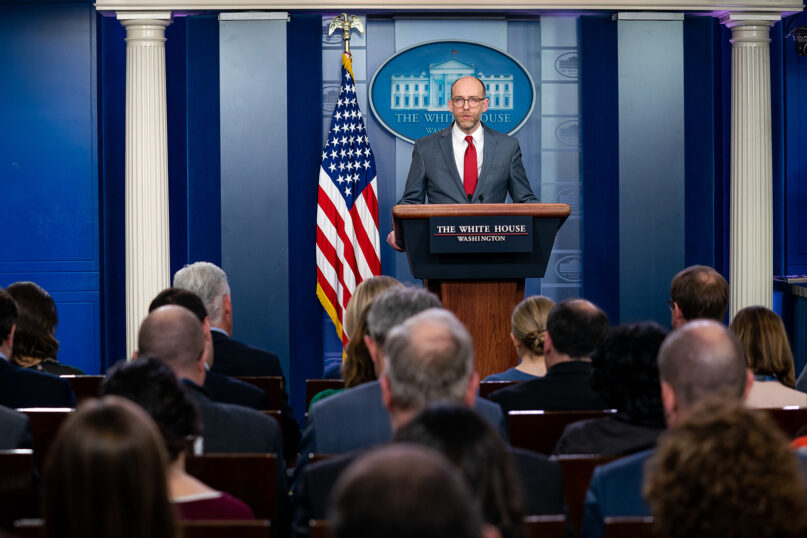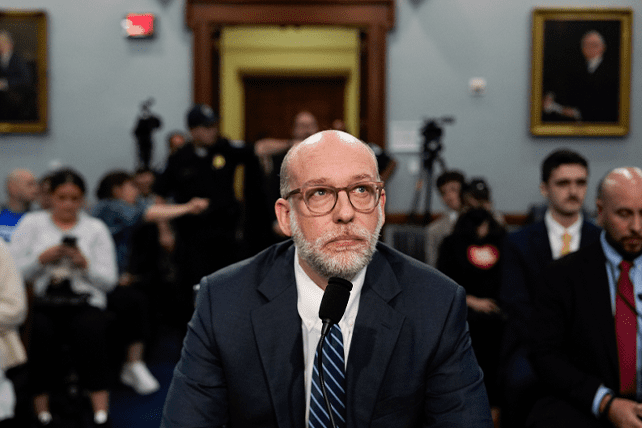Vought has said his initial plan was to do a short stint in the Trump administration before leaving to attend seminary and become a pastor. But after Trump lost to Joe Biden in 2020, Vought has said, “God had other plans.” He founded his own think tank, the Center for American Restoration, promptly renaming it the Center for Renewing America, a change he said was inspired by the New Testament’s Letter to the Romans: “Do not be conformed to this world, but be transformed by the renewal of your mind, that by testing, you may discern what is the will of God.”

Acting Director of the Office of Management and Budget Russell Vought speaks at a press briefing Monday, March 11, 2019, in the James S. Brady Press Briefing Room of the White House. (Official White House Photo by Tia Dufour)
As a private citizen, he increased his use of religious rhetoric, taking on an apocalyptic tone out of sorts with his image as a buttoned-down bureaucrat. In May 2021 in Dayton, Ohio, he spoke to the Forge Leadership Network, a training program for young conservatives, prompting them to “examine public policy and ethics from a Judeo-Christian worldview.”
Speaking calmly but with unmistakeable passion, he laid out for the audience a vision of America in decline — a decline, he said, that has befallen the country because “as a people, we have forgotten God.” He lamented that a country “created by God-fearing men” now “denies those who share our values a place in it.”
“We don’t have culture. We don’t have the media. We don’t have the corporations,” Vought said. “In the modern era, conservatives have pretty much one single way to influence public policy and the culture: It’s through politics and governing. We must pull that lever.”
The key, he argued, was to engage in “soulcraft”: “It’s time to insist that our leaders focus on the cultural fights that they have for so long avoided.”
Meanwhile, writers at Center for Renewing America — whose fellows included Kash Patel, currently director of the FBI — railed against progressive and “postmodern” Christians who “undermine the revealed truth they claim to serve.” The group’s 2022 budget proposal opened with a reference to the Bible’s First Book of Samuel as part of an argument that “the government itself is increasingly weaponized against the people it is meant to serve.”
Vought, for his part, even blasted fellow conservatives such as New York Times columnist David French, tagging him the “Colin Kaepernick of the evangelical church.”
Christian nationalism was incorporated into his rationale for decimating the federal government. In 2022, he tweeted, “… if the question is whether Christian Nationalism beats secular globalism & whether a woke/weaponized administrative state needs to be deconstructed … the answer is emphatically yes.”
He grew bolder about promoting Christian nationalism in public appearances and behind closed doors. In a hidden-camera footage recorded by the Centre for Climate Reporting, a British nonprofit, Vought told two men posing as relatives of a wealthy conservative donor that he believes in “Christian nation-ism” and wants to “rehabilitate Christian nationalism.”
Around this time Vought was often heard using the phrase “Duty is ours; results are God’s,” an axiom quoted by Christian nationalist leaders affiliated with groups such as Wallbuilders, the organization run by activist David Barton. Vought attributed it to “the Founders” and President John Quincy Adams but, like other dictums embraced by Christian nationalists, the sourcing is dubious: Researchers at the Massachusetts Historical Society, which holds Adams family papers, told RNS they couldn’t find any instance of Adams using the phrase.
It was partly through Christian nationalism that Vought became tied to a group of deeply conservative evangelical Calvinists in the orbit of Doug Wilson, a pastor who has spent decades seeking to build a Christian nationalist community in northern Idaho and recently emerged as an influential figure in far-right intellectual circles. In an interview in February, Wilson told RNS he doesn’t know the specifics of Vought’s theology, but said, “I would guess that we’d be on a similar page.”

